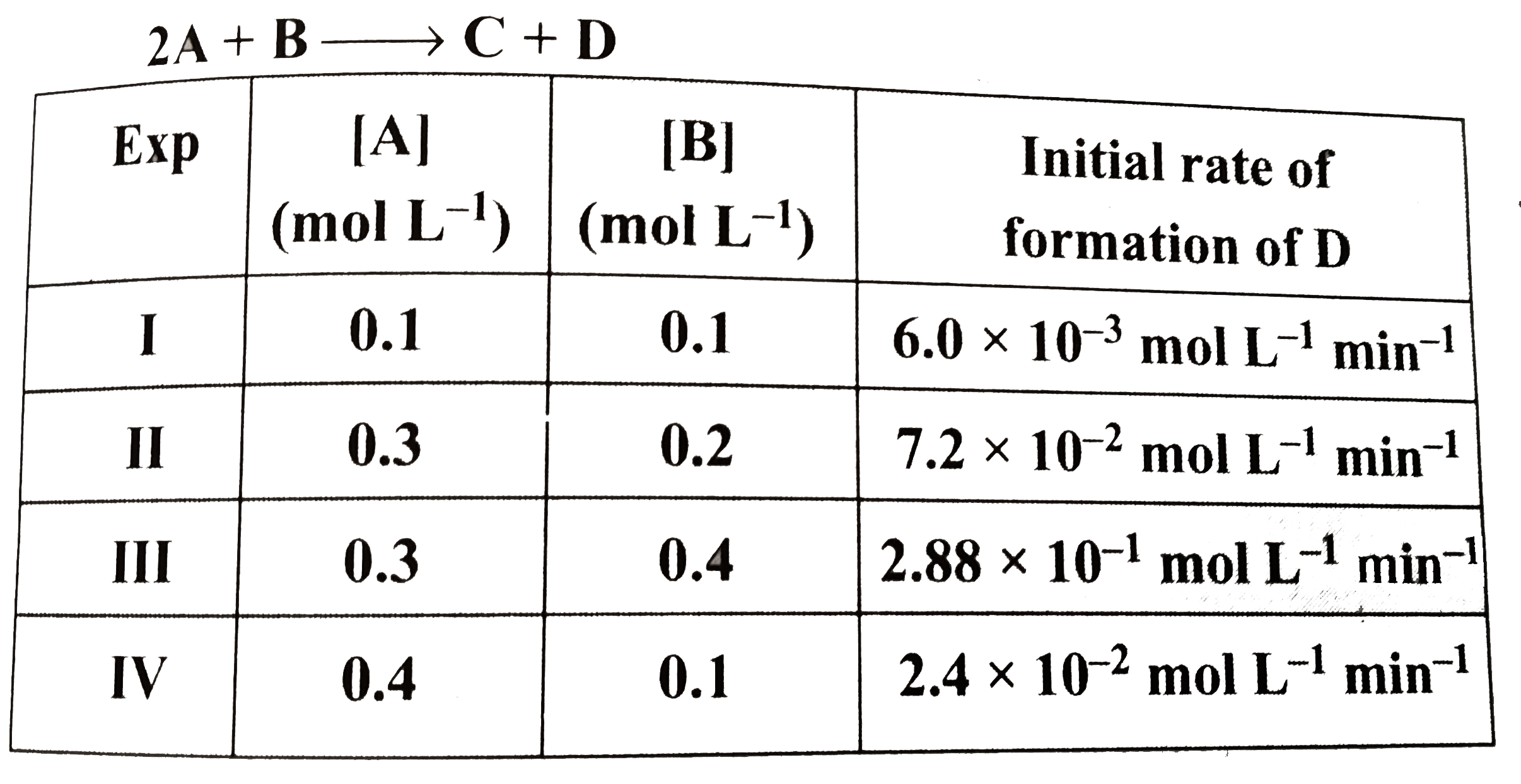The following rate data were obtained at 300 K for the reaction
2A+B→C+D
![The following rate data were obtained at 300 K for the reaction 2A +B to C +D Calculate the rate of formation of D when : [A]=0.5 mol L^(-) and [B]=0.2 mol L^(-)](https://d10lpgp6xz60nq.cloudfront.net/physics_images/KAL_KLC_ISC_CHE_XII_C04_SLV_081_Q01.png)
Calculate the rate of formation of D when : [A]=0.5 mol L− and [B]=0.2 mol L−
The correct Answer is:Rate =k[A][B]2;0.1molL−−min
Rate of reaction is given as: Rate =k[A]x[B]y Rates of reaction in experiments 1 to 4 are:
(i)5.0×10−3=k(0.1)x(0.1)y
(ii)6.0×10−2=k(0.3)x(0.2)y
(iii)2.4×10−1=k(0.3)x(0.4)y
(iv)2×10−2=k(0.4)x(0.1)y
Dividing eq. (i) by (iv), we get,
5.0×10−32.0×10−2=k(0.1)x(0.1)yk(0.4)x(0.1)yor(14)1=(14)x ,
hence x=1
Dividing equation (ii) by (iii), we get :
6×10−22.4×10−1=k(0.3)x(0.2)yk(0.3)x(0.4)yor14=(12)2=(12)y ,
hence y=2
Rate equation =k[A][B]2
from experiment (i) 5×10−3=k(0.1)1(0.1)2
thus ,k=5×10−3(0.1)(0.1)2=5
hence, rate =5×(0.5)1(0.2)2=0.1molL−min−1
Topper's Solved these Questions
- CHEMICAL KINETICSBOOK - ICSECHAPTER - CHEMICAL KINETICSEXERCISE - INTEXT QUESRTIONS
81 Videos
- CHEMICAL KINETICSBOOK - ICSECHAPTER - CHEMICAL KINETICSEXERCISE - EXERCISE (PART- I (OBJECTIVE QUESRTIONS)A.FILL IN THE BLANKS)
54 Videos
- CHEMICAL KINETICSBOOK - ICSECHAPTER - CHEMICAL KINETICSEXERCISE - ISC EXAMINATION QUESTIONS (NUMERICAL PROBLEMS )
57 Videos
- BIOMOLECULESBOOK - ICSECHAPTER - BIOMOLECULESEXERCISE - ISC EXAMINATION QUSTIONS (PART-I)(DESCRIPTIVE QUESTIONS)
21 Videos
- CHEMISTRY IN EVERYDAY LIFEBOOK - ICSECHAPTER - CHEMISTRY IN EVERYDAY LIFEEXERCISE - EXERCISE (PART - II (DESCRIPTIVE QUESTIONS) (LONG ANSWER QUESTIONS))
19 Videos
Similar Questions
form the gaseous reaction
2A+B2→2AB, the following rate data were obtained at 300K.

Calculate the rate constant for the reaction and the rate of formation of AB when [A] is 0.02 and [B2] is 0.04molL−1 at 300K.
View Solutionform the gaseous reaction
2A+B2→2AB, the following rate data were obtained at 300K.

Calculate the rate constant for the reaction and the rate of formation of AB when [A] is 0.02 and [B2] is 0.04molL−1 at 300K.
View SolutionThe following rate data were obtained at 303 K for the following reaction :
2A+B→C+D

What is the rate law? What is the order with respect to each reactant and the overall order? What are the units of rate constant?
View SolutionThe following rate data were obtained at 303 K for the following reaction :
2A+B→C+D

What is the rate law? What is the order with respect to each reactant and the overall order? What are the units of rate constant?
View SolutionThe following rate data were obtained at 303 K for the following reaction :
2A+B→C+D

What is the rate law? What is the order with respect to each reactant and the overall order? What are the units of rate constant?
View SolutionThe following rate data were obtained at 303K for the following reaction:
2A+B→C+D

What is the rate law? What is the order with respect to each reactant and the overall order? Also calculate the rate constant and write its units.
View SolutionFor the reaction :
2A+B→A2B
the rate =k[A][B]2 with k=2.0×10−6mol−2L2s−1. Calculate the initial rate of the reaction when [A]=0.1molL−,[B]=0.2molL−1. Calculate the rate of reaction after [A] is reduced to 0.06molL−1.
View SolutionFor the reaction A+B→C. The following data were obtained. In the first experiment, when the initial concentrations of both A and B are 0.1M, the observed initial rate of formation of C is 1×10−4mollitre−1minute−1. In the second experiment when the initial concentrations of A and B are 0.1M and 0.3M, the initial rate is 9.0×10−4molliter−1minute−1. In the third experiment when the initial concentrations of both A and B are 0.3M the initial rate is 2.7×10−3mollitre−1minute−1.
(a) Write rate law for this reaction.
(b) Calculate the value of specific rate constant for this reaction.
View SolutionFor the reaction, 2A + B → products, when the concentrations of A and B both were doubled, the rate of the reaction increased from 0.3 mol L−1s−1 to 2.4 mol L−1s−1. When the concentration of A alone is doubled, the rate increased from 0.3 mol L−1s−1 to 0.6 mol L−1s−1.
Which one of the following statements is correct ?
View SolutionFor the reaction, 2A+B→ products, when the concentrations of A and B both were doubled, the rate of the reaction increased from 0.3molL−1s−1 to 2.4molL−1s−1. When the concentration of A alone is doubled, the rate increased from 0.3molL−1s−1 to 0.6molL−1s−1. What is overall order of reaction ?
View Solution
